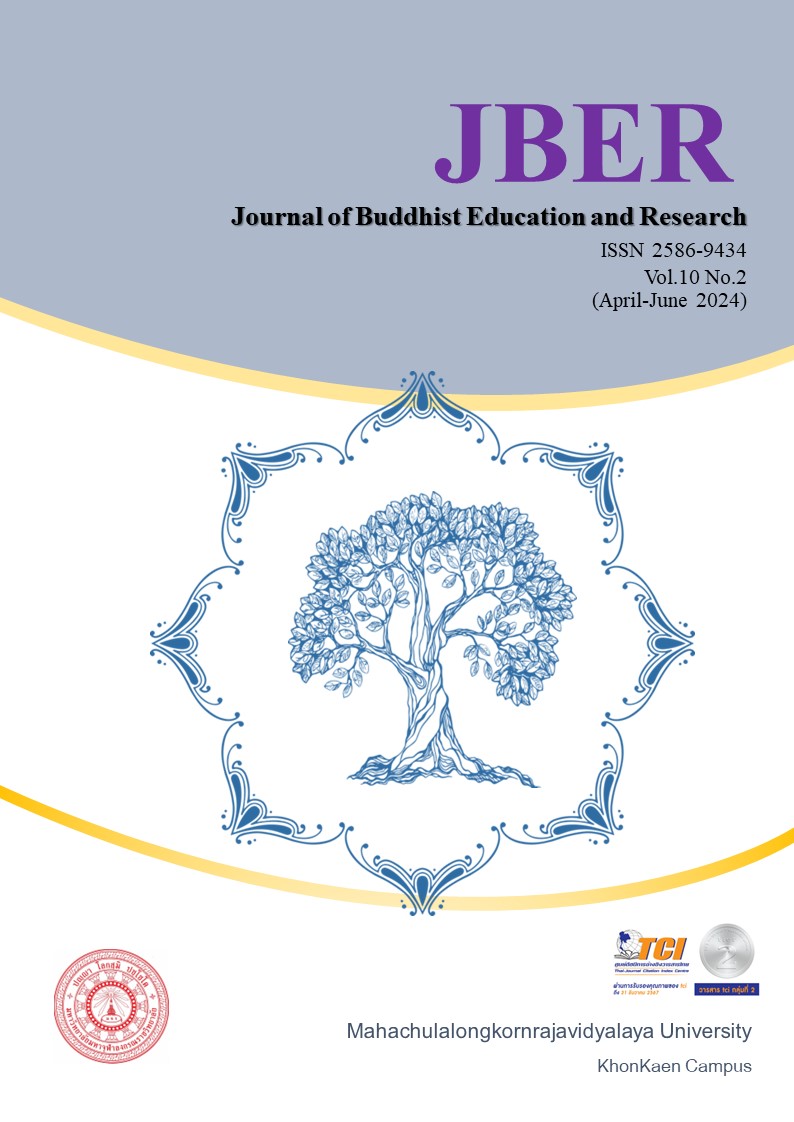THE LEARNING MANAGEMENT IN THE HISTORY SUBJECT ON THE DEVELOPMENT OF THE SUKHOTHAI KINGDOM USING BRAIN-BASED LEARNING CONCEPTS WITH METAVERSE FOR THE FIRST YEAR SECONDARY SCHOOL STUDENTS AT KHOK SI PHITTHAYASAN SCHOOL, MUEANG DISTRICT, KHON KAEN PROVINCE
Keywords:
The Learning Management, The History Subject, Brain-Based Learning, MetaverseAbstract
This research aimed to 1) study the conditions and learning management approaches, 2) determine the efficiency of learning management, 3) compare the learning achievement, and 4) assess the students' satisfaction with learning management. The target group for this research was 32 of 1/1 students at Khok Si Phitthayasan School, Mueang District, Khon Kaen, enrolled in the first semester of the 2023 academic year, selected via simple random sampling. The tools used included 1) a learning management condition questionnaire, 2) an interview form, 3) a lesson plan, 4) a pre-and post-learning achievement test, 5) Metaverse media, and 6) a student satisfaction questionnaire. The statistical methods used for analysis were the mean, standard deviation, and significant statistics at the .05 level, along with calculating the efficiency value (E1/E2) using statistical software.
The research results were as follows:
1) The condition of learning management in the history subject on the development of the Sukhothai Kingdom using brain-based learning concepts with Metaverse for the first-year secondary school students at Khok Si Phitthayasan School was overall at a high level.
2)The efficiency analysis of learning management in the history subject on the development of the Sukhothai Kingdom using brain-based learning concepts with Metaverse for first-year secondary school students at Khok Si Phitthayasan School had an efficiency of 86.70/84.38, meeting the 80/80 criteria.
3)The comparison of learning achievement in the history subject on the development of the Sukhothai Kingdom between pre-learning and post-learning using brain-based learning concepts with Metaverse for first-year secondary school students at Khok Si Phitthayasan School showed significantly higher post-learning scores at the .05 level.
4) The student satisfaction analysis with learning management in the history subject on the development of the Sukhothai Kingdom using brain-based learning concepts with Metaverse for first-year secondary school students at Khok Si Phitthayasan School was at the highest level.
References
กมลฉัตร กล่อมอิ่ม. (2560). การจัดการเรียนรู้โดยใช้สมองเป็นฐาน สำหรับนักศึกษาวิชาชีพครูสาขาพลศึกษา. Veridian E-Journal Silpakorn University, 10(1), 77.
กรกช ขันธบุญ. (2565). รูปแบบการสื่อสารผ่านเมตาเวิร์สเพื่อการเรียนการสอนสาขาวิชานิเทศศาสตร์มหาวิทยาลัยสุโขทัยธรรมาธิราช. Journal of Humanities & Social Sciences (JHUSOC), 20(3), 123-124.
กระทรวงศึกษาธิการ. (2553). หลักสูตรแกนกลางการศึกษาขั้นพื้นฐาน พุทธศักราช 2551 (พิมพ์ครั้งที่ 3).กรุงเทพมหานคร: โรงพิมพ์ชุมนุมสหกรณ์การเกษตรแห่งประเทศไทย จำกัด.
ธิติรัตน์ สมบูรณ์. (2565). Metaverse อนาคตการศึกษาข้ามพรมแดนการเรียนรู้จากโลกจริงสู่โลกเสมือน. สืบค้นเมื่อ 10 สิงหาคม 2566, https://www.chula.ac.th/highlight/64690/
ประกาศกระทรวงศึกษาธิการ เรื่อง การบริหารจัดการโครงสร้างหลักสูตรสถานศึกษา 8 กลุ่มสาระการเรียนรู้ และ 1 รายวิชาพื้นฐานประวัติศาสตร์ ของสถานศึกษาขั้นพื้นฐาน. (2566, กุมภาพันธ์ ๒๐). ราชกิจจานุเบกษา, 140(39ง)
รัตนาพร คงยวง. (2565). การพัฒนาชุดกิจกรรมการเรียนรู้ภาษาไทย ด้วยการจัดการเรียนรู้โดยใช้สมองเป็นฐาน เรื่อง ชนิดของคำ สำหรับนักเรียนชั้นประถมศึกษาปีที่ 6. (ปริญญาการศึกษามหาบัณฑิต สาขาวิชาภาษาไทย, มหาวิทยาลัยนเรศวร).
สำนักงานวิชาการและมาตรฐานการศึกษา. (2554). เพื่อนคู่คิด มิตรคู่ครู แนวทางการจัดกิจกรรมการเรียนรู้ ประวัติศาสตร์. กรุงเทพฯ: โรงพิมพ์ชุมนุมสหกรณ์การเกษตรแห่งประเทศไทย จำกัด.
Christian Moro. (2022). Utilizing the metaverse in anatomy and physiology. journal of Anatomical Sciences Education, 16(4), 580.
Rattanakul Kongpha. (2023).The Virtual Interactive Learning Model using Imagineering Processvia Metaverse. Higher Education Studies, 13(1), 35.
Talan, T., & Kalınkara, Y. (2019). Students' opinions about the educational use of the Metaverse. International Journal of Technology in Education and Science (IJTES), 6(2), 333.
Downloads
Published
How to Cite
Issue
Section
License

This work is licensed under a Creative Commons Attribution-NonCommercial-NoDerivatives 4.0 International License.





